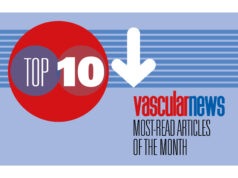Short-stay endovascular aneurysm repair (EVAR) is a safe and cost-effective option for selected patients, reducing hospital length of stay by at least three days, a study has shown.
Naail Al Zuhir, Cambridge Vascular Unit, Cambridge University Hospitals NHS Trust, Cambridge, UK, presented the results of the investigation at the recent European Society for Vascular Surgery Annual Meeting in Athens, Greece.
“EVAR is a well established and less invasive procedure for abdominal aortic aneurysm repair. Although abdominal aortic aneurysm patients usually have significant co-morbidities, EVAR still offers the potential for a reduced hospital length of stay,” he told delegates. “The aim of this study was to identify patients suitable for short-stay EVAR with a one night hospital stay and document their outcome.”
Patients for EVAR were assessed prospectively for short-stay EVAR over an 18-month period using Day Surgery guidelines. Joint anaesthetic and surgical approval was necessary for these patients to be included in this vascular pathway. These patients were admitted on the day of surgery to the vascular ward with a designated care protocol for discharge the day after.
One hundred and one patients were selected for elective EVAR on an intention-to-treat basis. Of the total, 93% were male and the mean age was 76±7.1 years. The mean aneurysm maximal diameter was 6cm (±1.0). Thirty three patients met the criteria for short-stay EVAR, and 27 patients were successfully discharged one day post operatively.
Six patients (22%) failed short-stay EVAR: one with only an extra day due to unforeseen transport problems, one patient had urinary retention with haematuria and stayed for seven days, two were due to being elderly and living alone and two patients had unexpected difficulty with graft implantation, their length of stay was also an extra day.
Sixty eight patients were not selected for short-stay EVAR because of different issues: 42% had a history of unstable ischaemic heart disease, chronic obstructive pulmonary disease or chronic kidney disease requiring rehydration perioperatively, 19% required pre-operative internal iliac embolisation, 13% had transport issues, 12% were not assessed by the vascular nurse practitioner and 15% were deemed as a technically difficult EVAR.
Median length of stay for short-stay EVAR was one day, versus four days for the EVAR patients who were not selected for this modality (p=0.0001). The average cost of stay for short-stay EVAR was £9,844 vs. £13,360 for conventional hospital stay. The investigators saw to re-admission after discharge.
In conclusion, Al Zuhir said “This experience suggests short-stay EVAR can be extended to more patients with modified, less restrictive, day of surgery selection criteria, while arranging appropriate discharge planning prior to admission.”













